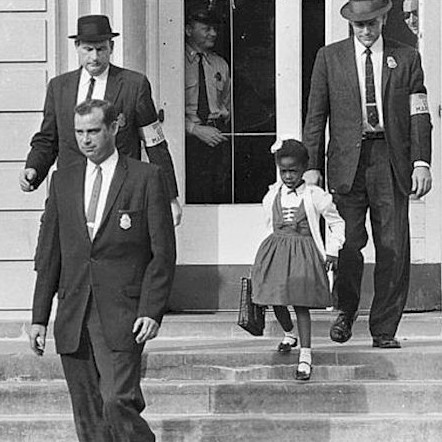A movie about the first Black child to integrate an all-white elementary school in New Orleans was pulled from a Florida school.
White parents objected to the “Ruby Bridges” story being viewed by students because it would teach them about the evils of racism.
However, the white writer of the film says the protesters are missing the point.

One of the loudest protesters against the movie about the civil rights hero has been Emily Conklin, the mother of a second-grade student at North Shore Elementary. She became aware of the teacher’s plan to show the movie after the school sent out permission slips and trailers for the film two weeks before the film was scheduled to be shown.
Conklin and one other parent refused to allow their children to view the film, MSN reported.
On March 6, the frustrated mother filed an official complaint.
Here is a copy of the objection form filed by Conklin.
In her complaint, Conklin explained she didn’t want her young child to see white people using racial epithets, throwing things, spitting and doing other hateful acts toward a young Bridges, believing the historical face of Southern segregation was inappropriate for second graders.
School officials sided with her and decided to temporarily ban the movie until a special committee could review its appropriateness.
Toni Ann Johnson, who wrote the film, tweeted about the controversy, saying those who object to the film have missed the intention of the film altogether.
“Ruby Bridges, a film I wrote that was released twenty-five years ago, is banned in a Florida school because a full-of-s–t parent thinks ‘the movie might teach white children to hate Black children.’ It teaches white children to empathize with Ruby,” she tweeted.
North Shore Elementary is a part of the Pinellas School District, a district that is 51 percent white, 19 percent Black, 18.3 percent Hispanic/Latino and 4 percent Asian, according to U.S. News and World Report. North Shore Elementary, in particular reportedly is 57 percent white, 24 percent Black and 12 percent Hispanic.
While whites make up the majority of the student population, there are other voices of different communities that aim to be heard.
According to the Tampa Bay Times, Ric Davis, the president of the Concerned Organization for Quality Education for Black Students, has used his voice over the last few years to speak out against banning books about civil rights and Black culture.
“Many from historically marginalized communities are asking whether this so-called integrated education system in Pinellas County can even serve the diverse community fairly and equitably,” Davis said.
Davis believes Florida’s political climate is so tense that educators are insecure about using materials that might mention race in their lessons — including books and movies. They are also torn because they want to teach history in a factual manner, despite the discomfort it might cause.
The historicity of the “Ruby Bridges” film is not in question, but it is an issue.
“At the highest level of decision-making in the district, they have to have more sensitivity to the diversity of the community they serve and not overreact because one white person objected to something,” he said.
Many on social media spoke out, questioning the perceived fragility of the second graders.
YouTuber LanaQuest tweeted, “If at 6 Ruby was strong enough to deal w/racism white kids are strong enough to learn about it.”
Jill Filipovic also posted, “Ruby Bridges needed guards to walk her through a violent mob when she was 6 just so she could go to school, but apparently second graders in Florida are too young to learn about it.”
Some just pointed to the state’s right-leaning politics.
Not everyone in Florida politics is against the film being shown in the school.
Former St. Petersburg police chief and deputy mayor Goliath Davis spoke out about the removal of “Ruby Bridges,” calling the move a “ban.”
“I was stunned to hear the news and thought it must be an idle rumor. I asked myself, what objection could there possibly be to a historical fact of courage and an attempt to obtain an equal education in America?” Goliath Davis wrote in The Weekly Challenger.
He detailed Bridges’ experience and how once she was enrolled in her Louisiana school, white parents withdrew their children from the school. He also mentioned how one white teacher stayed and educated the young girl.
The politician stated, “So here we are 63 years later, and the salient question is whether or not a high-ranking district administrator, in violation of existing policy, directed a school administrator at Northshore Elementary in St. Petersburg to remove a film depicting the Bridges story.”
Like Davis, he believes teachers are “confused and fearful.”
“Regrettably, the political environment surrounding MAGA Republicans, Mothers of Liberty, and Governor Ron DeSantis continues to foster a movement of division, historical denial, and instability,” he continued with his comments.
He added somewhat of a salute to teachers for considering showing the movie amid Florida’s political climate. “There may be a question about the district’s action regarding the film ‘Ruby Bridges,’ but there is no question that the Northshore Elementary School administrators and teachers are to be commended for their commitment to fully educating our children.”